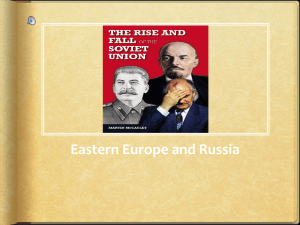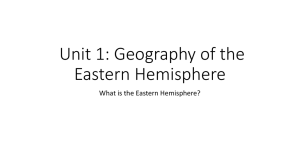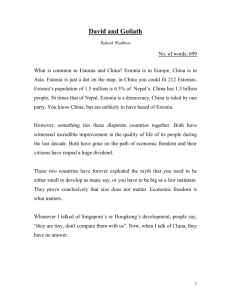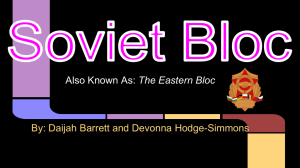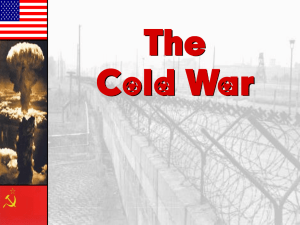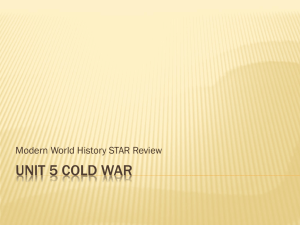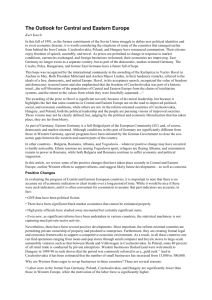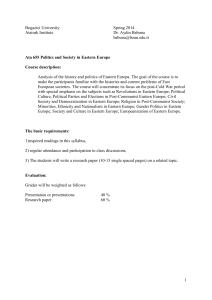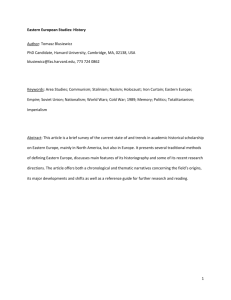Estonia and Hungary: a case study in the Soviet experience
advertisement
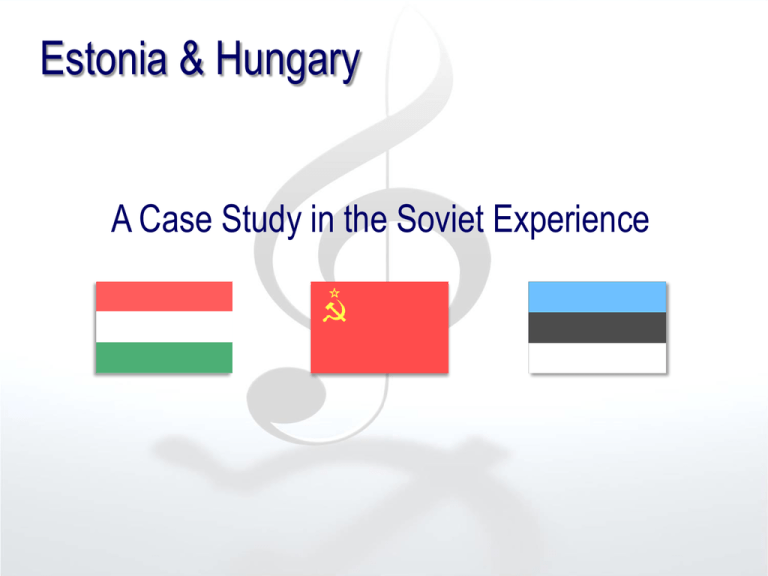
Estonia & Hungary A Case Study in the Soviet Experience Bell Ringer A region is basically defined as a part of the country, or world, that is different or separate from others in some way. Regions can be identified by: – – – – Culture: Music, Language, Food, Holidays Geography: Mountains, Deserts, Plains, Coastal lands Wildlife: Animals, Insects, Plant life Politics: People-made borders/boundaries/agreements. • How is your state part of a region? Identify one example from each of the previous elements and explain its connection to the region. • Example: People in Texas listen to country music like other people in the South. • Today you will study how the region of Eastern Europe was impacted by foreign occupation during World War II. On your outline map: • Color the Eastern European region in yellow or orange. •Identify and label the countries of Estonia and Hungary. Outline Map http://commons.wikimedia.org/wiki/File:Template_europe_map.png What do you mean you can’t find Estonia? Try the following map… Overview • Eastern Europe is a region composed of many countries, stretching from the Baltic to the Black Sea. • Each country has its own regional elements (culture, landforms, wildlife and politics). • In the years before, during, and after World War II, (1939-1945) Eastern Europe underwent political domination by two powerful entities: Nazi Germany and Soviet Russia. • Use the 4 political cartoons to create a summary paragraph of the relationship between the Nazis and Soviets. • Once you have created your summary, predict how this relationship might have had an impact on the countries located between Germany and Russia. Find the Venn Diagram on Your Worksheet Estonia Hungary Culture Geography Politics Foreign Occupation Invader Influence of Violence Method of Resistance Venn Diagram Instructions • As you watch “The Singing Revolution,” write down examples of the categories, located in the middle column, in the “Estonia” circle: • Categories- – Culture – Geography – Politics – Occupation by foreign invaders – Influence of invaders – Violence – Method of Resistance The Hungarian Revolution:1956 • In the following clips, you will see how a “Soviet” country began one of the first open rebellions to the Soviet system. • As you watch the two newsreels, fill in examples of the categories on the “Hungarian” side of the Venn Diagram. • When the clips are over, we will discuss what we saw. It will then be your task to find the “missing” elements by conducting a search on the internet. Your Teachable Moment! • Once you have filled in your elements for Hungary, you are to create a presentation to share with the class. Follow these guidelines: – Pick a third Eastern European country that was under Soviet control by conducting a search on the internet. Check with me once you have picked your country in order to receive approval to further conduct your research. – Label this country on your handout outline map. – Create a PowerPoint to use with your presentation. The presentation must include all the elements found in the middle circle of the Venn Diagram (Culture, Geography, Politics, Occupation by Foreign Invaders, Influence of Invaders, Violence, Method of Resistance) as well as a map and title slide introducing the country. – As you present this country to the class, provide examples of how this country’s experience compares (similar/different) to that of Estonia and Hungary. Your rubric is on the handout. Sources • Eastern Europe Map http://commons.wikimedia.org/wiki/File:Eastern_Europe_Map.jpg • http://upload.wikimedia.org/wikipedia/commons/d/db/Central_and_Ea stern_Europe_Map.png • Eastern Europe Map template http://commons.wikimedia.org/wiki/File:Template_europe_map.png • Cartoons: http://historynotes.net/2010/10/archive-of-americanpolitical-cartoons/cartoon_hitlerstalin/ • http://www.history.ucsb.edu/faculty/marcuse/publications/reviews/Bar thRev069.htm • Cartoon: Nazi/Soviet Pact. Wonder How Long the Honeymoon Will Last? The Granger Collection, NY


